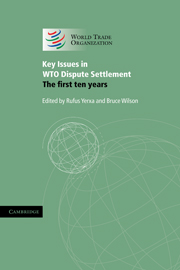Book contents
- Frontmatter
- Contents
- Notes on contributors
- Preface
- Table of cases
- Abbreviations
- PART I Introduction and General Considerations
- 1 The power of the WTO dispute settlement system
- 2 The WTO dispute settlement and general international law
- PART II The WTO Dispute Settlement System: Its Processes and Its Institutions
- PART III The WTO Dispute Settlement System: Systemic and Other Issues
- PART IV Annexes
1 - The power of the WTO dispute settlement system
from PART I - Introduction and General Considerations
Published online by Cambridge University Press: 04 August 2010
- Frontmatter
- Contents
- Notes on contributors
- Preface
- Table of cases
- Abbreviations
- PART I Introduction and General Considerations
- 1 The power of the WTO dispute settlement system
- 2 The WTO dispute settlement and general international law
- PART II The WTO Dispute Settlement System: Its Processes and Its Institutions
- PART III The WTO Dispute Settlement System: Systemic and Other Issues
- PART IV Annexes
Summary
The dispute settlement system of the WTO is one of the most important elements of a rules-based multilateral trading system. By way of introduction to the very instructive chapters that follow, I would like to make several observations about the nature of dispute settlement in a trading system based on national sovereignty, followed by some comments on how the system is designed to ensure integrity and fairness in the WTO's adjudicative process.
WTO dispute settlement and national sovereignty
The unique feature of the WTO is that, unlike many international regimes, it has an adjudication process that is mandatory and binding. Yet what does that mean, given the fact that the WTO operates in a world where international rules do not override national sovereignty? Remember, most WTO Members do not give direct effect to WTO rules or decisions, and implementation of any ruling requires actions by the Member in question, often by a complex process of legislation. Furthermore, there is no WTO jail, and we have no power to levy fines or other monetary sanctions. In essence, sanctions, just like compliance, must come from sovereign actions of the WTO's Members.
Put another way, the GATT/WTO dispute settlement system has always had to deal with a basic paradox. On the one hand, it is unrealistic to expect Members to cede control over their borders to an international decision-making body. Yet the Members of the WTO clearly want the rules to mean something, and this cannot occur without some credible enforcement mechanism.
- Type
- Chapter
- Information
- Key Issues in WTO Dispute SettlementThe First Ten Years, pp. 3 - 6Publisher: Cambridge University PressPrint publication year: 2005



